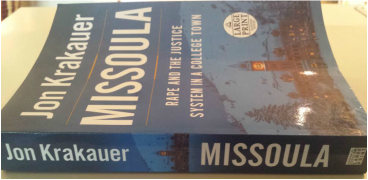This summer I got caught up on some reading. I’d like to say that this involved a sandy beach, tropical drinks, and a stack of smutty novels, but alas, the kind of reading I was intent on catching up on was much less fun. Case in point: John Krakauer’s Missoula. I had been putting off purchasing the book after I first saw it at a feminist bookstore in Madison back in April right after its release because of its almost 400 pages of content. I knew that what I would find in its pages would most likely bear a striking resemblance to my own work with crisis centers, campus officials, and community sexual assault response teams when the systems set up to help victims seek justice and safety utterly fail. And I wasn’t wrong. The book is real, really tough to read, and may send you reeling. So, this post is for folks who are on the fence about reading the book. Or for those of you who know it’s not for you but want to know more about it. Or for anyone processing your own experience reading the book. So, here are my thoughts.
- Krakauer provides detailed, comprehensive accounts of a few sexual assault cases. We’re talking everything from victims’ narratives to what rapists said in court to what prosecutors did or didn’t do in each case to what got said behind (and in front of) closed doors. You really get the big picture of how cases can go down, why few rapists get punished (whether through the criminal justice system or campus judicial process), how personal and political connections in a community can mean victims aren’t believed, and the impact of almost everyone at every stage of the process embracing super damaging myths about rape. To be honest, it’s a lot to take in, and this is coming from someone who has been involved in crisis response work full and part-time for almost a decade. It’s super informative and real, but dang, it’s a tough read. If you’re someone who has experienced sexual violence or you’re a crisis worker in major burnout mode, proceed with caution. This brings me to next point:
- Reading this book necessitates accompanying self-care. At least that’s my take. It took me much longer to get through a book this size than I would normally need because I had to take breaks. I came to dread reading it and longed for it to be over, though my determination to finish it helped me plow through. It was drudgery. In its attempt to give an outsider a look into how these things play out, those of us in the know read on with negatively cynical “Yep-seen-this-before-let-me-guess-what’s-next-no-surprise-here-we-go-again-everything-sucks” kind of mentality. I even realized, as I was reading, that I was more short-tempered and angsty then usual, which gave me even more motivation to just keep reading so my time with the book would be finished. So if you are going to read this book, I recommend hot baths, intense cardio, and whatever things you do to keep yourself sane and not intensely angry or sad all of the time. Seriously. Because this book made me want to yell at everyone about how messed up the world is (which I was mostly successful at not doing), and cry at how helpless I feel to change the system this book documents (which I did more than once, followed by unhealthy eating and/or long napping). But, should you get through the book, I’m guessing you might agree that:
- The cases in this book are not unique to Missoula. So the criticism you might have heard Krakauer receiving for his focus on this specific college town in Montana is moot. The thing is—and he makes this clear in the book—Missoula is not unlike most other campuses and communities responding (badly) to criminal and campus judiciary cases involving sexual assault, whether you’re talking statistics or specific details. The stuff he documents happens everywhere, including the crummy ways prosecutors can treat victims and the incapacity of community members to believe that someone they worship (an athlete, for example) could commit sexual violence. It got me thinking a lot about an Illinois county prosecutor—in a county I lived and worked in—who not only refused to charge a woman’s rapist with sexual assault but charged her with felony false reporting instead. Or the high school athletics coach in rural Missouri who was so adored by our community that folks organized rallies and painted their cars in support of him even after six high school girls came forward with allegations of sexual abuse and harassment. I’m sure you’ll make your own connections to the accounts in this book, and that itself is disturbing: far too many of us know the realities involved in sexual assault cases. What is different about this book, at least for me, is that:
- Krakauer offers a compelling parallel between sports and courtroom culture. In addition to its thoroughness, the thing I appreciate most about Missoula is the parallel Krakauer draws between sports culture and what’s happening in courtrooms—and this is that they’re both centered on winning. Just as athletes duke it out on the field with the goal of dominating the other team, prosecutors’ main goal is to win cases, not necessarily to fight for what is “good” or “just,” even when it comes to sexual violence. I’ve seen this play out so many times: police will do a competent investigation and gather solid evidence and testimony only for the prosecutor to refuse charging the accused rapist because they might not win the case. Usually, this is because of rape myths: if the victim was drinking, made decisions to go to a guy’s place, or does not resemble a “credible” (read: believable or likeable) victim (this is where factors of race, social class, population, reputation, etc. get figured in), they know that this will impact the findings of a case. So instead of taking on the responsibility to educate judges, jurors, and the public about these myths (which is indeed a challenging task), they often opt to not take on these cases so that they can have amazing-looking records that show how many cases they have won so they can get re-elected. Not only is this a major issue at community and institutional levels, this is a systemic issue that exposes a majorly messed up criminal justice system ill-equipped to respond to sexual violence in any meaningful way, at least most of the time. This being so, my opinion is that:
- The folks who really need to read this book are ones with power and influence on campuses and in communities. For those of us who work in the movement to end gender violence, this book offers little more than validation of the kinds of things we are witnessing in our own communities across the United States. For folks without the inside knowledge, I could see this book as a productive introduction, and imagine it being read in college-level criminal justice classes. Where I think it holds the most promise, however, is in the hands of people with power and influence to make change on the institutional level—I’m talking prosecutors and judges and university presidents and stakeholders and government officials and legislators and you get the point. The challenge is convincing any of these folks to read a 400-page report about it. Perhaps that it was written by a famous white male mountaineer will help us in this endeavor. I don’t mean this flippantly: as a guy who has climbed Mt. Everest amidst harrowing circumstances and published a ton of award-winning narrative non-fiction, you’d think the fact that he’s writing about sexual assault response would raise some eyebrows. It is, for Krakauer, a new kind of mountain to take on, one that many of us have been climbing for years, and many folks decades before us. And we need all the help we can get.


 RSS Feed
RSS Feed